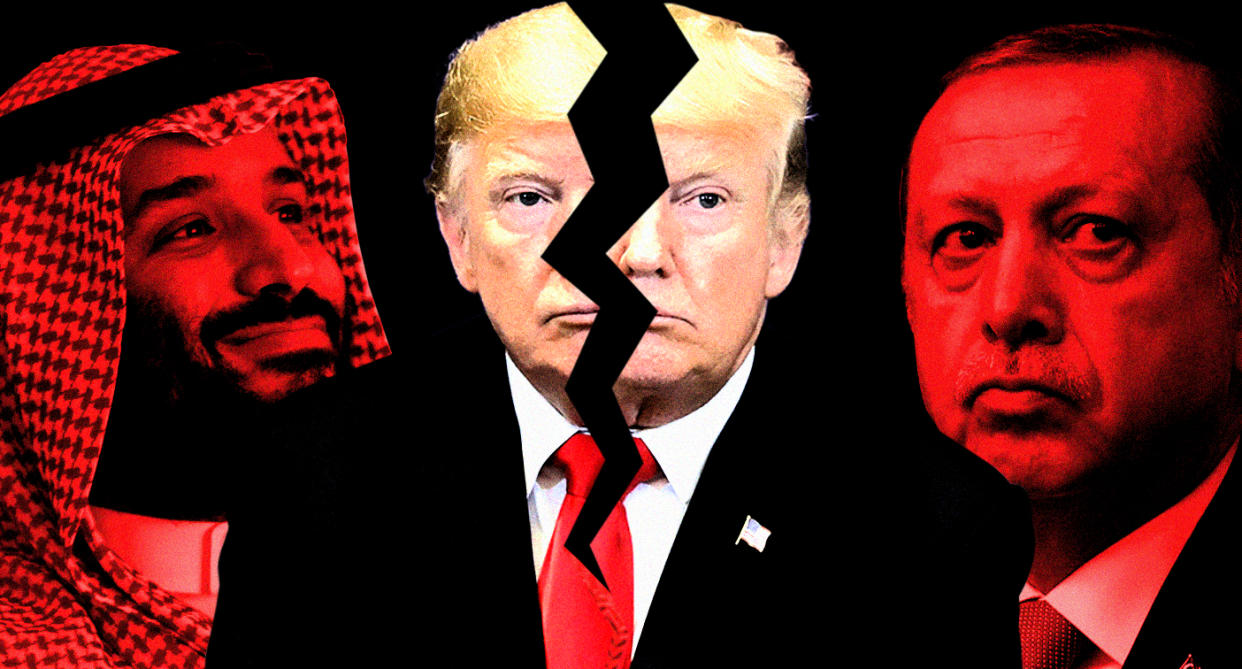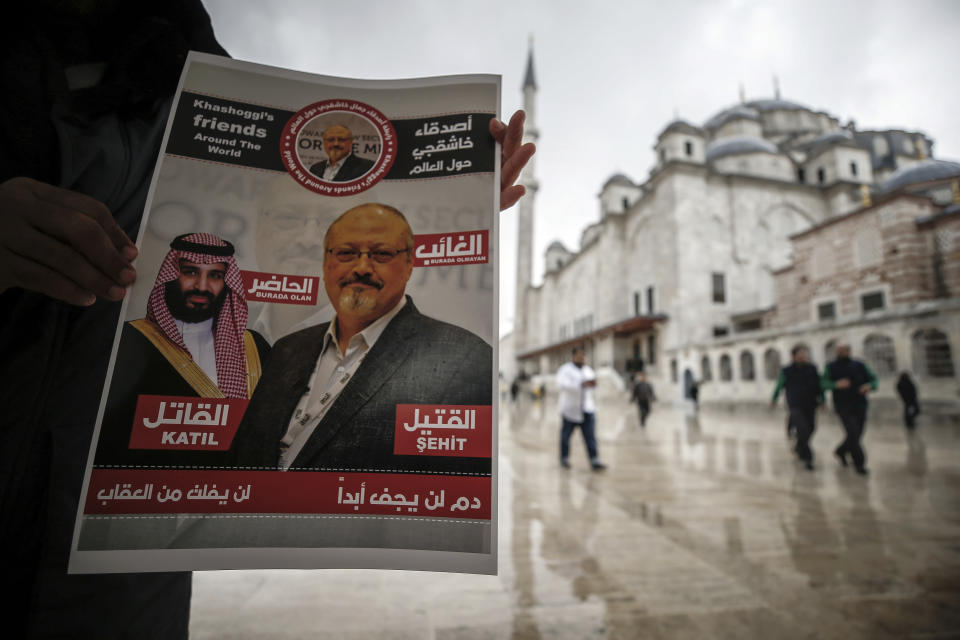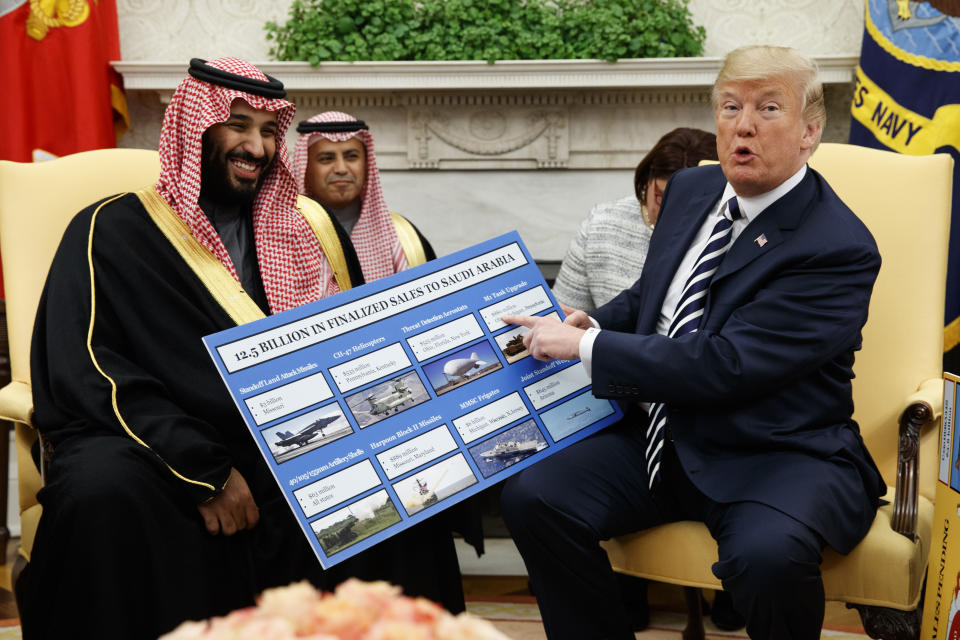In Khashoggi murder case, Trump is torn between 2 tyrants

With “friends” and allies like Turkey and Saudi Arabia, the Trump administration must wonder: Who needs an actual enemy like Iran in the Middle East? Almost from the moment that Saudi dissident journalist Jamal Khashoggi — a legal resident of the U.S. and a contributor to the Washington Post — disappeared mysteriously into the Saudi Arabian consulate in Istanbul in early October, Turkish President Recep Tayyip Erdogan has shrewdly exposed Saudi lies to humiliate a regional rival, keep the story in the headlines and thwart President Trump’s attempts to salvage his administration’s chummy relationship with Saudi Crown Prince Mohammed bin Salman. The scandal now threatens the U.S. Middle East alliance structure and the Trump administration’s strategy to isolate and contain Iran.
With carefully choreographed leaks, Erdogan’s government has continually undermined a shifting Saudi narrative that originally had Khashoggi leaving the consulate in good health, then dying of strangulation during a brawl with Saudi officials, and then falling victim to a “rogue” hit squad. Even President Trump has characterized Saudi explanations as “one of the worst in the history of cover-ups,” and the most recent version released Thursday is unlikely to put the crisis to rest. The Saudis now say a 15-member team of intelligence and security personnel, many with suspiciously close ties to the crown prince, was dispatched to bring Khashoggi home alive. Instead, the team leader supposedly made an on-the-spot decision to kill Khashoggi with drugs and then dismember his body for disposal.

Turkish officials, who say they have audio recordings that document the slaying, dispute that latest version. The capture team included an autopsy expert who reportedly carried a bone saw and quickly moved to dismember the body. The audio, which the Turks have shared with the United States and other allies, also reportedly captures the hit team leader instructing a superior over the phone to “tell your boss” the mission was accomplished. U.S. intelligence experts believe the “boss” is almost certainly a reference to the crown prince, known as “MBS,” who exerts nearly complete control of Saudi security and intelligence agencies.
Late Friday, the Washington Post reported that the CIA had concluded with “high confidence” that the killing was personally ordered by MBS.
Erdogan has called Khashoggi’s death “a savage murder” that shocks “the human conscience.”
The irony of Erdogan standing up for the “human conscience” and journalistic protection is not lost on close observers, who note that under his increasingly autocratic rule, Turkey has become by far the most prolific jailer of journalists in the world. According to the Committee to Protect Journalists, Turkey presently keeps more journalists behind bars than China, Russia and Egypt combined. In the World Press Freedom Index, published by Reporters Without Borders, Turkey now ranks 157 among 180 nations. After a failed 2016 military coup against his rule, Erdogan has also arrested tens of thousands of perceived political opponents, stifling dissent and drawing the reins of power in Turkey increasingly into his iron fist.

“The Khashoggi murder has given Erdogan enormous leverage to claim the moral high ground and frame the debate in a way that diminishes his regional rival MBS and drives a wedge between Washington and Saudi Arabia,” said Aykan Erdemir, a former member of the Turkish Parliament who is a senior fellow at the Foundation for the Defense of Democracy in Washington. “What’s lost in that framing is that Erdogan is an authoritarian Islamist leader who has made a career out of trying to undermine the U.S.-led liberal international order. He routinely jails journalists and political opponents, engages in ‘hostage diplomacy’ with the United States, continues to defy sanctions on Iran, undermines U.S. military operations against ISIS in Syria, and has engineered a strategic pivot toward Iran and Russia. And the Khashoggi crisis has only made him more daring and emboldened.”
Khashoggi’s death thus leaves the Trump administration torn between two tyrants. One is widely believed to be responsible for the assassination of a U.S.-resident journalist as well as for the world’s greatest humanitarian crisis, in Yemen, where the Saudi military is pursuing a scorched-earth campaign against Iranian-backed rebels. The other, Erdogan, is a persistent human rights offender who takes Americans hostage for diplomatic leverage and increasingly aligns his country with U.S. adversaries such as Russia and Iran. Hanging in the balance is the administration’s strategy for making MBS and Saudi Arabia the linchpin for containing Iran and reaching a peace deal between Israel and the Palestinians. That strategy is predicated on an unusually close personal relationship that Trump son-in-law and adviser, Jared Kushner, formed early on with MBS, which led to Trump’s decision to make Saudi Arabia the first country he visited as president last year.
“The Saudis have assumed a huge role in the Trump administration’s Middle East policy based largely on the Trump family’s close relationship with MBS and the House of Saud, which is the kind of family-to-family relationship that the Saudi royals are really comfortable with, but not how you would expect a democratic republic like ours to conduct its foreign policy,” said Eric Edelman, a former U.S. ambassador to Turkey and currently counselor at the Center for Strategic and Budgetary Assessments in Washington. “So while I credit the Trump administration for recognizing Iran as the greatest strategic threat in the region, their strategy is now tied to a very rash and impulsive MBS, who seems to have serious judgment issues. On the other side of the Khashoggi issue, you have another authoritarian and impulsive ally in Erdogan, who is doing everything in his power to use the crisis to take the Saudis down a peg in international opinion and undermine U.S.-Saudi relations.”

Whether or not MBS survives the Khashoggi scandal, the Trump administration has probably invested too heavily in the U.S.-Saudi partnership to risk a serious break. After tearing up the Iran nuclear deal, the Trump administration’s plans for containing Tehran, ending a catastrophic conflict in Yemen and reaching any accommodation between Israeli and the Palestinians all run through Riyadh.
While Turkey’s determination to expose the complicity of Saudi leaders in the Khashoggi slaying should be applauded on human rights grounds, over the long term it may not obscure what some observers see as an ongoing strategic divergence between Washington and Ankara.
“After taking a beating in recent years for his human rights record, Erdogan is leveraging the Khashoggi scandal to hold himself up as the principled international player, which is kind of absurd,” Steven Cook, a senior fellow for Middle East and Africa studies at the Council on Foreign Relations and author of “Neither Friend Nor Foe: The Future of U.S.-Turkey Relations,” said in an interview. Turkey’s domestic oppression, military incursion into Syria and strategic tilt eastward, he notes, all point to a more fundamental divergence of interests and values. “While Turkey remains a NATO ally formally, you can’t really say it’s a partner of the United States any longer.”
James Kitfield is a senior fellow at the Center for the Study of the Presidency & Congress.
_____
Read more from Yahoo News:
George Conway: Republican Party has become a ‘personality cult’ under Trump
An American killing: Why did the U.S. Park Police fatally shoot Bijan Ghaisar?
Cory Booker: I will ‘take some time over the coming months’ to consider 2020 bid
Hugh Jackman on ‘The Front Runner’: I told Gary Hart I took his legacy ‘very seriously’

